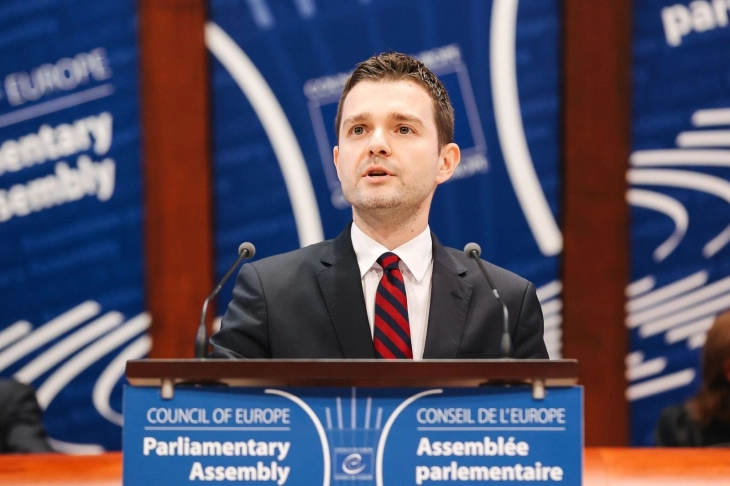Macedonia’s Foreign Minister, Timcho Mucunski, addressed the Autumn Session of the Parliamentary Assembly of the Council of Europe (PACE) in Strasbourg this week, emphasizing the ongoing challenges in the country’s journey toward European Union integration. Despite North Macedonia’s diligent efforts to meet all necessary requirements, obstacles persist, testing the resilience of both institutions and the patience of the people, Mucunski stated.
“Imagine the frustration of a nation that has complied with every demand, only to be told that the goal remains out of reach. How can one sustain hope when the fundamental principles of the European Union—solidarity, justice, and unity—seem to be applied unevenly?” Mucunski asked in his speech.
Nonetheless, Mucunski affirmed the government’s unwavering commitment to the necessary reforms and the core values of EU membership, despite the prolonged integration process.
“We will not allow these injustices to fuel Euro-skepticism. On the contrary, we will persist in our fight for the rightful place of North Macedonia in Europe, driven by the conviction that justice will ultimately prevail. Though the road may be long, we remain dedicated to European values, advocating for a process that is fair, transparent, and founded on mutual respect,” the Foreign Minister declared.
He also noted that the year 2025 will mark significant milestones—30 years of North Macedonia’s membership in the Council of Europe and 20 years since the European Council granted the country EU candidate status.
“This has been a period of profound transformation, in which the Council of Europe played a crucial role in implementing reforms and meeting European standards in vital sectors. While challenges have arisen along the path to EU membership, the completion of our European integration is inevitable. However, the pace of this process depends heavily on the predictability and credibility of the EU’s accession procedures,” Mucunski remarked.
The Foreign Minister also addressed broader issues currently confronting Europe, such as Russia’s aggression in Ukraine, the lingering effects of the pandemic, economic crises, the erosion of democratic values, rising extremism, migrant trafficking, and the growing impact of climate change and new technologies.
Mucunski underscored the importance of the Council of Europe and its legal frameworks in addressing these crises, especially their impact on human rights, democracy, and the rule of law. He highlighted the pivotal role of the European Court of Human Rights in Strasbourg and called for strengthening the European Convention on Human Rights system, particularly the enforcement of court rulings by member states.
The Ministry of Foreign Affairs and Foreign Trade concluded the session by reaffirming its commitment to these goals in an official press release.





Comments are closed for this post.